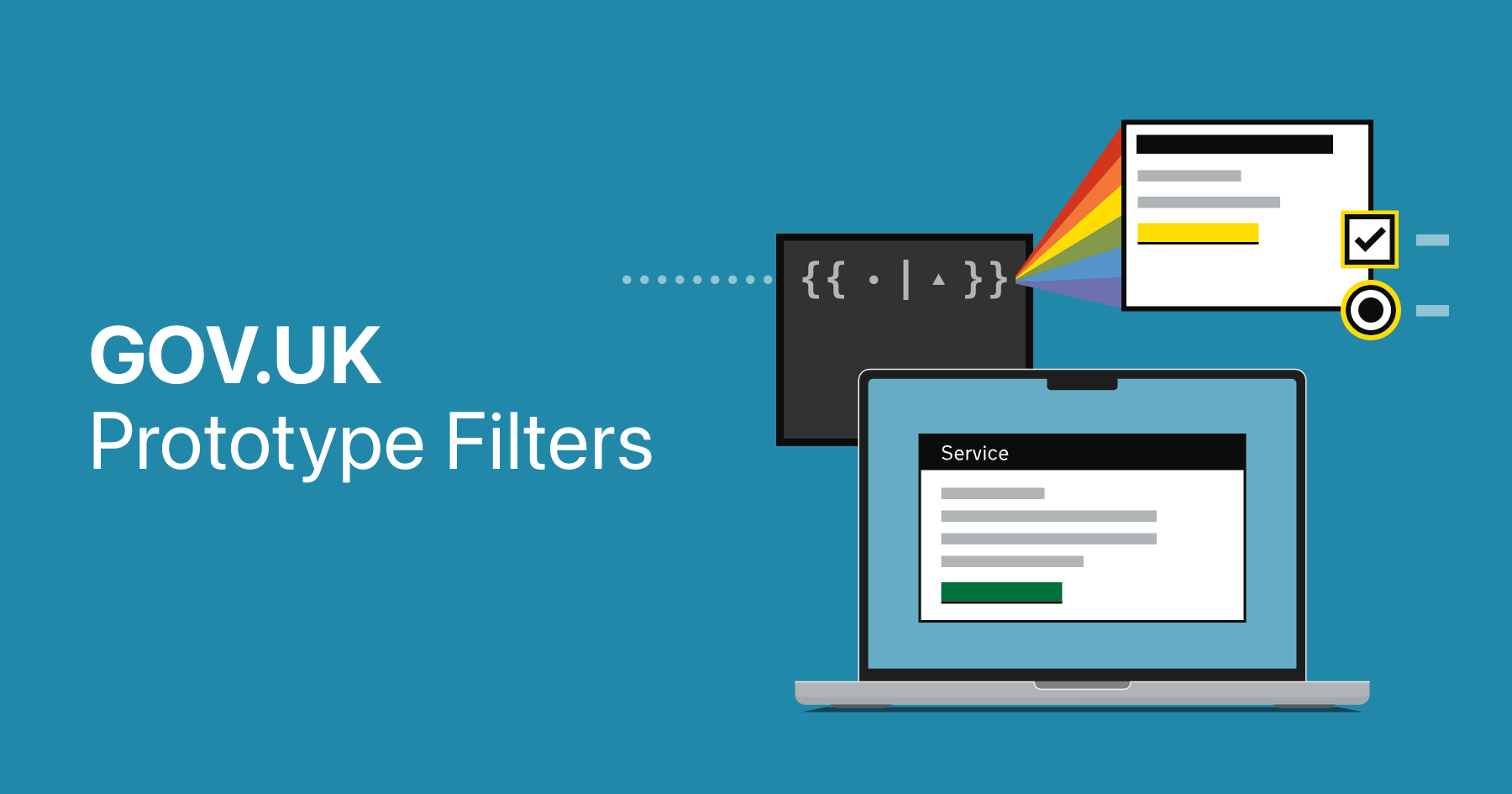Rapidly prototype with data using this set of helpful template filters

One of the most exciting features included in version 13 of the GOV.UK Prototype Kit is its new plugin system.
It means you can now use components, styles and other features, either from within your own organisation or developed by the wider cross-government community, in your own prototypes.
One feature plugins can provide is template filters. A feature of the Nunjucks templating language, filters are functions that allow you to modify variables. Separated by a pipe symbol (|), they can be chained together, with the output of one filter passed on to the next.
For example, {{ "<p>GOV.UK</p>" | striptags | lower }} will remove the HTML tags, lower-case the remaining string and output gov.uk.
Both striptags and lower are examples of filters builtin to Nunjucks. While it’s always been possible to add your own filters to the Prototype Kit, it can be time-consuming, if not entirely frustrating at times.
Introducing GOV.UK Prototype Filters
The GOV.UK Prototype Filters plugin provides a set of helpful filters, built specifically for users of the GOV.UK Prototype Kit.
For example, it can be difficult to take dates entered into the govukDateInput component and then display them correctly on another page such as ‘Check your answers’. Even if you use a date library like Luxon, you still have to remember which formatting tokens to use.
GOV.UK Prototype Filters provides several date filters that can help.
Let’s say we have a single page in our prototype that uses the govukDateInput component to collect a date:
{{ govukDateInput({
id: "issued",
namePrefix: "issued",
fieldset: {
legend: {
text: "When was your passport issued?",
isPageHeading: true,
classes: "govuk-fieldset__legend--l"
}
},
hint: {
text: "For example, 27 3 2007"
}
}) }}
Submitting a page with this component would add the following values to session data:
{
'issued-day': '1',
'issued-month': '2',
'issued-year': '2003',
}
To display this date on our ‘Check your answers’ page, we can now use the isoDateFromDateInput filter:
{{ data | isoDateFromDateInput("issued") }}
This will output the following ISO 8601 formatted date:
2003-02-01
This isn’t very readable and doesn’t follow the GOV.UK style guide for dates. However, we can use it in tandem with the govukDate filter:
{{ data | isoDateFromDateInput("issued") | govukDate }}
Now we have a correctly formatted, human readable date:
1 February 2003
The govukTime filter behaves similarly. The GOV.UK style guide for times recommends using am and pm suffixes, and midday and midnight instead of 12:00pm and 12:00am.
Using the govukTime filter means times will always be displayed in the correct format. For example:
{{ "2021-08-17T00:00:31" | govukTime }}
{{ "2021-08-17T12:00:59" | govukTime }}
{{ "2021-08-17T18:30:00" | govukTime }}
{{ "08:15" | govukTime }}
will output:
midnight
midday
6:30pm
8:15am
As an aside, providing either "now" or "today" to govukDate and govukTime filters will output the current date or time, also formatted correctly.
The initial collection
The first version of this plugin includes 21 filters grouped into 5 categories:
- Array filters
-
formatList,isArray,rejectFromArray,selectFromArrayanduniqueFromArray. - Date filters
-
duration,govukDate,govukTime,isoDateFromDateInputandmonthName. - Number filters
-
currency,isNumber,ordinalandplural. - Object filters
-
isObject,objectToArray. - String filters
-
govukMarkdown,isString,noOrphans,slugifyandstartsWith.
Installation
To use this plugin with the Prototype Kit, go to your terminal and type the following:
npm i @x-govuk/govuk-prototype-filters
That’s it! If you start your prototype, and go to the ‘Plugins’ section of ‘Manage your prototype’ (http://localhost:3000/manage-prototype), you’ll see ‘GOVUK Prototype Filters’ listed as an installed plugin. You can use these filters in your templates straight away.
Contribute
Combining the extensibility of the Prototype Kit’s plugin system with community-led projects like this, means designers can spend more time prototyping brilliant government services, instead of wrestling JavaScript.
This project already includes contributions from colleagues across government.
Just this month, Chris Barrett at Defra added the duration and uniqueFromArray filters, while Tom Mearns at UK Export Finance suggested improvements to the previous sterling filter so that it could be used to format foreign currencies.
If you have an idea for a filter or have any feedback about the initial collection, please create an issue on the project’s GitHub repository.